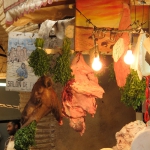 “Shall we find a baguette?” I asked, ducking into the covered market. Avoiding another sting, I strayed from the bee covered pastries and sweets, past the cones of colored spices, beyond the buckets of honey and oils.
“Shall we find a baguette?” I asked, ducking into the covered market. Avoiding another sting, I strayed from the bee covered pastries and sweets, past the cones of colored spices, beyond the buckets of honey and oils.
My eyes fell upon hundreds of chickens. Each stall fronted a runway with scratching white feathered chickens. On the back wall, cages of lovely hens stacked on one another, often a rooster perched atop, ankle tethered to the metal. Occasionally rabbits, pigeons, turkeys or other live fowl were on display. Buyers would point, and the sellers quickly bound the feet together, tossing the feathered bundle on the scale, equaling out as weights were added to the other side.
We continued down the alimentary canal of livestock, stopping suddenly at a bloodied butcher drenched in chicken. An old fashioned grinder to his right, feathers spewed everywhere. A trickle of blood ran out his stall. As my eyes followed the stream, it converged to a river; looking down, I then noticed a steady flow of blood beneath our feet. A man hurried past, Jay motioned towards the fresh cow head mounted over his right shoulder, vital dripping down his back as brains and such spilled forth. The visceral attack didn’t end, each butcher proudly displayed entrails, brains, rows of severed heads.
The creme de la creme- a dozen freshly cut hearts hot on a griddle, each punctured with its own toothpick. A camel head adjoined to his dissected upperhalf remained on sale. Knives were dancing, hands without gloves, stalls without sinks… Moving along, skirting the blood, butchers bumping into you, trying to keep our sandaled toes sterile, I looked up one last time and noticed between these stalls of bloodied carcasses were beautifully stacked designs of cured green olives, tomatoes, chilies.
“A free taste?” offered the vendor. “La Shukran,” (no thanks) we replied, trying not to perseverate on everything we learned about disease. “Let’s get the bread later,” I shuddered.
[smooth=id:8]

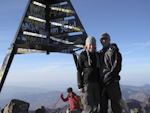 Tipping back the last of their red wine, eyes gazing from the window on Portland’s drizzle, she whispered, “Would you climb the highest peak in Northern Africa with me?” The apartment already barren, furnishings gone, their belongings bursting from two backpacks, “Should we sacrifice a goat first?” he smiled.
Tipping back the last of their red wine, eyes gazing from the window on Portland’s drizzle, she whispered, “Would you climb the highest peak in Northern Africa with me?” The apartment already barren, furnishings gone, their belongings bursting from two backpacks, “Should we sacrifice a goat first?” he smiled.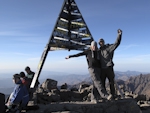
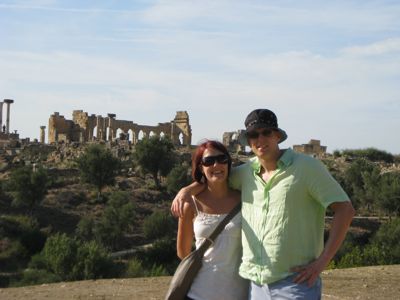 Chez Amy, our home away from home, our Casablanca Command Center, checking in between every significant excursion. You wont find this one in the Lonely Planet.
Chez Amy, our home away from home, our Casablanca Command Center, checking in between every significant excursion. You wont find this one in the Lonely Planet.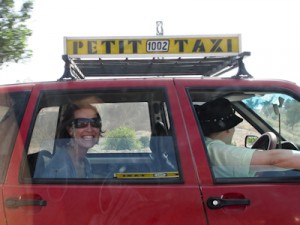
 It was a local bus, it stopped everywhere. As we inched our way toward Algeria and into the Sahara, the military presence increased in every town. Finally, a taxi dropped us off in the middle of the desert, a ghost town. We were fifty kilometers from the border.
It was a local bus, it stopped everywhere. As we inched our way toward Algeria and into the Sahara, the military presence increased in every town. Finally, a taxi dropped us off in the middle of the desert, a ghost town. We were fifty kilometers from the border.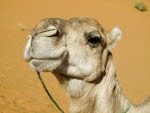 In a small garden courtyard, over a pot of tea, I negotiated hard, a camel for my girl, a night in the desert. A deal was struck and my guide and I walked alongside Darlene, regal on her camel. From high in the dunes, we could gaze over the black Sahara and into Algeria.
In a small garden courtyard, over a pot of tea, I negotiated hard, a camel for my girl, a night in the desert. A deal was struck and my guide and I walked alongside Darlene, regal on her camel. From high in the dunes, we could gaze over the black Sahara and into Algeria. That night, after a fiery sunset, the moon rose over our camp, a valley in the dunes, a lone date palm, and a grumpy caravan of camels. Two cots pushed together, we slept in the open air, under a pile of wool blankets.
That night, after a fiery sunset, the moon rose over our camp, a valley in the dunes, a lone date palm, and a grumpy caravan of camels. Two cots pushed together, we slept in the open air, under a pile of wool blankets.
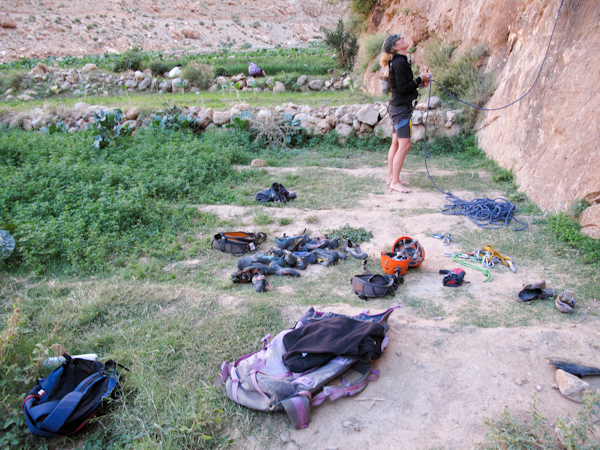 Climbing Magazine rates The Todra Gorge number one in North Africa, as does Hassan, a stocky 38-yr-old Berber who created most of the routes. “You know Lynn Hill?” he asks, “she put up an 8+, we call it Nice, Nice, because she is so very nice.” Organized tour buses loop retired tourists from Germany, Israel and Spain through the gorge. We emerge from a rusted out Mercedes Benz taxi, circa 1960s, with backpacks and dirty clothes, and immediately discern hundreds of bolts caressing the rock.
Climbing Magazine rates The Todra Gorge number one in North Africa, as does Hassan, a stocky 38-yr-old Berber who created most of the routes. “You know Lynn Hill?” he asks, “she put up an 8+, we call it Nice, Nice, because she is so very nice.” Organized tour buses loop retired tourists from Germany, Israel and Spain through the gorge. We emerge from a rusted out Mercedes Benz taxi, circa 1960s, with backpacks and dirty clothes, and immediately discern hundreds of bolts caressing the rock.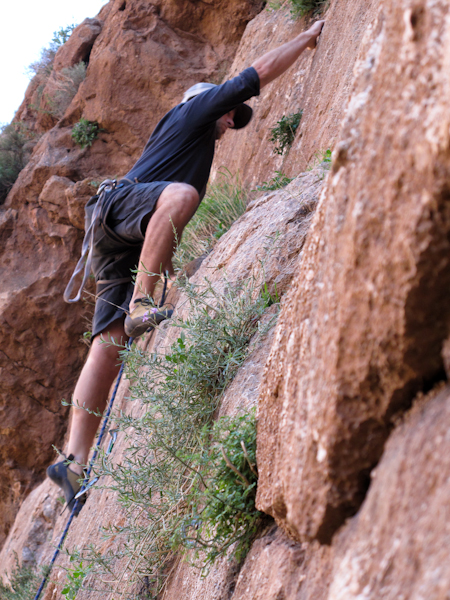 f beautiful sport climbing. Decades of experience, he needed few draws, skipping multiple bolts, I could hardly keep up the belay. Jay would lead and I would clean. So went our days. Around Berber women working terraced gardens, we had access to awesome cliffs. Technical cracks, ridges, sharp crags and overhangs worked our unconditioned, lazy bodies.
f beautiful sport climbing. Decades of experience, he needed few draws, skipping multiple bolts, I could hardly keep up the belay. Jay would lead and I would clean. So went our days. Around Berber women working terraced gardens, we had access to awesome cliffs. Technical cracks, ridges, sharp crags and overhangs worked our unconditioned, lazy bodies.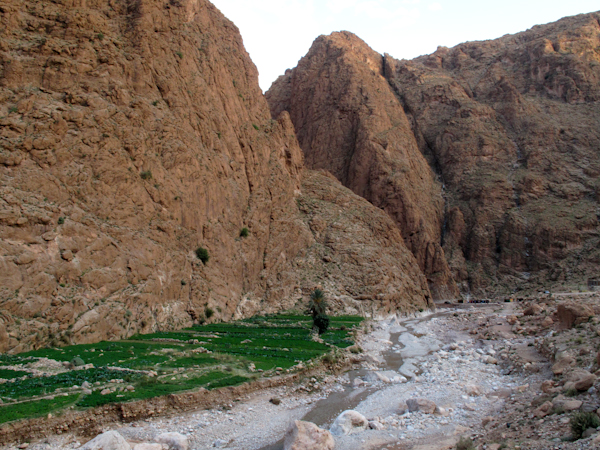 A days end, fingers sores, we would retrace our steps back to Hotel Valley and share stories over steaming Moroccan tea. Hassan taught us the formality of pouring from the silver teapot 2 or 3 feet above the first cup, then dumping its content back into the pot. Three times was tradition. Finally, the tea was poured evenly into small glasses and passed around. He has smoked his entire life, doesn’t want children, no need for a website or internet, “I know already too many people…” He has traveled, France was too expensive, Morocco is preferred.
A days end, fingers sores, we would retrace our steps back to Hotel Valley and share stories over steaming Moroccan tea. Hassan taught us the formality of pouring from the silver teapot 2 or 3 feet above the first cup, then dumping its content back into the pot. Three times was tradition. Finally, the tea was poured evenly into small glasses and passed around. He has smoked his entire life, doesn’t want children, no need for a website or internet, “I know already too many people…” He has traveled, France was too expensive, Morocco is preferred.